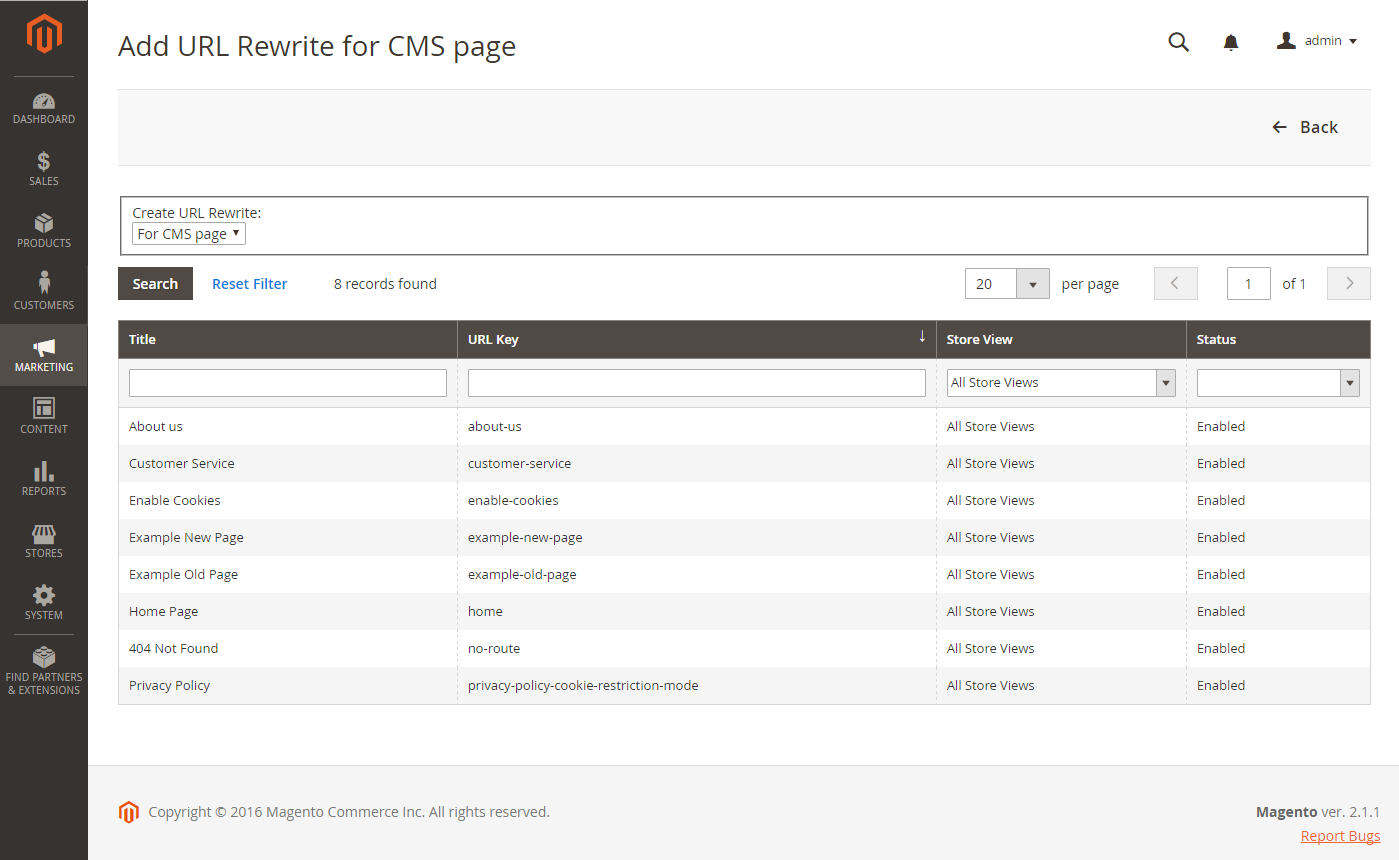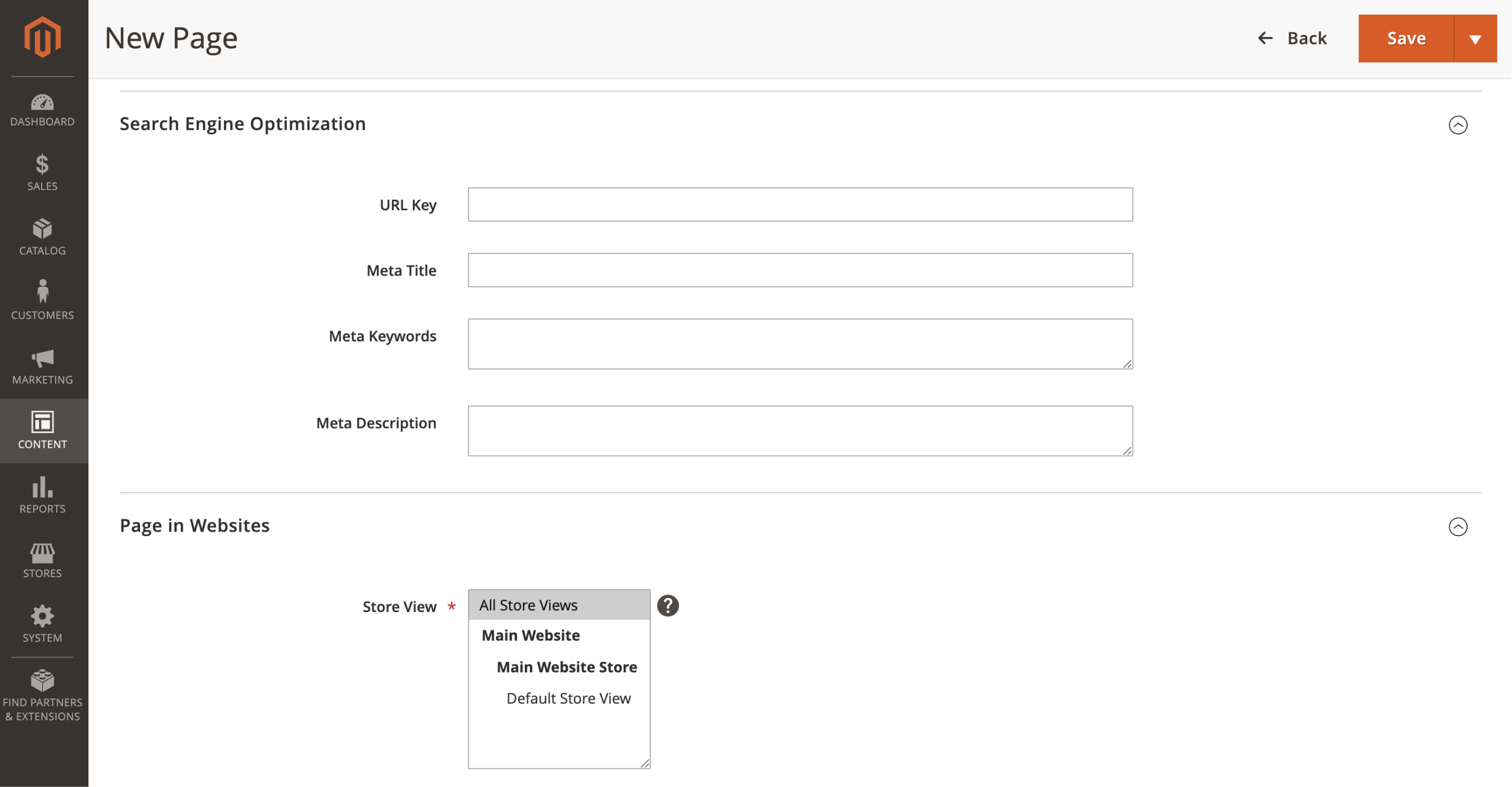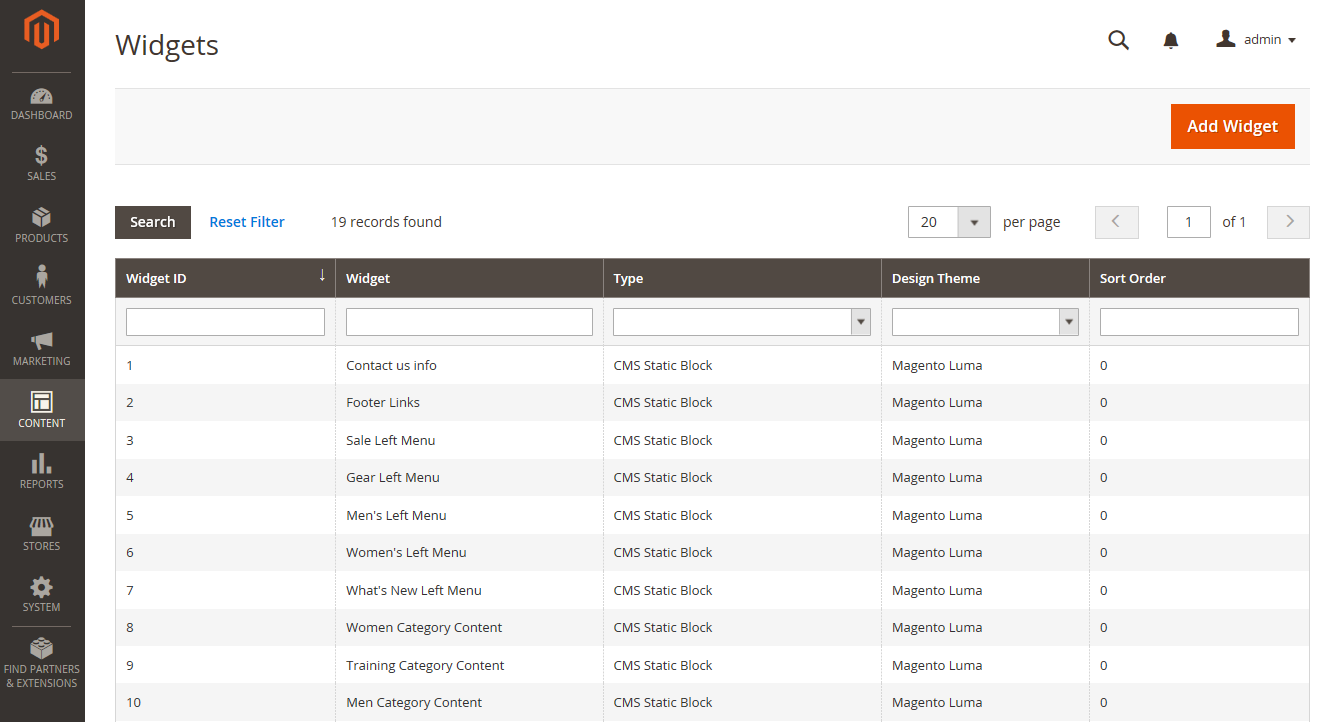In today’s digital age, content management systems (CMS) are frequently pigeonholed into two primary roles: fueling blog-centric platforms or powering eCommerce sites. This narrow view, however, overlooks the multifaceted capabilities of advanced systems.
Enter Magento CMS, a robust platform renowned for crafting bespoke eCommerce experiences and adeptly managing online stores of varying scales and complexities. Beyond its acclaimed eCommerce prowess lies a lesser-known, yet equally impressive, facet: its comprehensive content management functionalities. This article aims to shed light on the extensive features of Magento CMS, emphasizing its strengths in areas such as website development, search engine optimization (SEO), and a plethora of advanced capabilities that enhance the overall digital experience.
Table of Contents
Fundamentals of Magento Content Management System
The Magento Content Management System (CMS) stands as a beacon of innovation and efficiency in the realm of eCommerce and website management. Let’s explore the fundamentals of this powerful platform.
Is Magento a CMS?
A common query in the digital commerce sphere: Is Magento a CMS? Given its extensive content management functions, it’s understandable why Magento is often categorized as a content management system (CMS). However, Magento’s identity extends beyond the traditional confines of a CMS.
Primarily, Magento is an open-source eCommerce solution. It provides businesses with a comprehensive platform for building and managing their online stores. This platform encompasses a vast array of features tailored to the intricate needs of digital commerce, from inventory management to customer engagement tools.

But the question becomes more intriguing with Magento 2, the latest iteration of the platform. Magento 2 brings enhanced performance, improved scalability, and bolstered security to the table, addressing some of the most critical needs of modern online businesses. More importantly, it integrates powerful CMS capabilities, blurring the lines between a dedicated eCommerce solution and a conventional content management system.
Magento 2 functions effectively as an eCommerce solution with a strong emphasis on content management. It allows users to handle content with as much proficiency as it manages eCommerce operations. This dual capability makes Magento 2 a unique and versatile tool in the world of digital commerce, providing users with the flexibility to manage their online presence comprehensively, both as a retail space and a content hub.
Using Magento as a CMS vs. Magento for eCommerce
Magento has firmly established itself as a powerhouse in the eCommerce domain, designed specifically to cater to the needs of online retail. This includes a comprehensive set of functionalities for building and managing a product catalog, processing orders, and storing customer data. The platform’s open-source nature further enhances its appeal, offering near-limitless customization possibilities.
Using Magento for eCommerce
At its core, Magento excels in eCommerce capabilities. Users can leverage its extensive features to create a unique storefront, integrating various services such as payment gateways and analytics tools. The platform’s ability to adapt and scale with the business is a key advantage. However, this power comes with complexity, often necessitating the need for skilled developers or a team to fully realize a store’s potential.
Using Magento as a CMS
The introduction of Magento Commerce 2.3 marked a significant shift, introducing a drag-and-drop content management solution to the platform. This feature was a game-changer, simplifying content management and making it more accessible. However, it was with the release of Magento Open Source 2.4.3 and later versions that this functionality became available to a broader user base, including Magento Open Source users.
The inclusion of the new Page Builder functionality in Magento 2.4.3 represented a substantial step towards enabling full site editing. This development was pivotal in positioning Magento not just as an eCommerce platform but also as a comprehensive CMS solution. While numerous page builder extensions existed prior, the official solution integrated into Magento CMS solidified its status as a versatile tool capable of full-fledged CMS functionalities.
Magento’s MVC Architecture
Magento’s architecture is built on the Model-View-Controller (MVC) design, a widely respected structure in the world of web development. This design pattern distinctly separates the application into three interconnected components:
- Model: This element is responsible for managing the application’s data. It acts as a bridge between the database and the rest of the application, handling data retrieval, storage, and processing.
- View: The View is where the user interface comes to life. It’s all about presenting data to the user in an accessible and aesthetically pleasing manner. This segment is responsible for everything the end user interacts with on the screen, translating raw data into a comprehensible format.
- Controller: Serving as the control logic, the Controller is the intermediary that connects the Model and the View. It processes user inputs, interacts with the Model to retrieve data, and sends that data to the View for presentation.

The strength of Magento’s MVC architecture lies in its compartmentalization of tasks. This separation not only enhances adaptability but also simplifies maintenance and scaling, especially crucial for complex eCommerce websites.
Magento uniquely serves as both an eCommerce platform and a CMS. It offers robust functionality for setting up online stores and managing their content efficiently, all while leveraging the robust framework it’s built upon. This dual capability makes Magento a powerful tool in the eCommerce domain, capable of handling complex requirements with ease.
Can you use Magento as a CMS?
The answer is Yes, Magento can be used as a Content Management System (CMS). It is a highly popular choice, powering over two hundred thousand websites globally and ranking among the top ten most utilized CMSs. Magento’s strength lies in its robust functionality tailored specifically for building and managing online stores and marketplaces.
As mentioned above, While Magento is primarily recognized for its eCommerce capabilities, it also encompasses essential features of a CMS, allowing users to create, manage, and modify content on their websites.
Compared to WordPress, which is another leading CMS, Magento offers a more specialized set of tools specifically for eCommerce. WordPress, with its WooCommerce plugin, is another widely used open-source solution for online commerce. However, Magento stands out for its comprehensive features and scalability, making it particularly suitable for larger, more complex online stores and businesses that require advanced eCommerce functionalities.
Why Should We Choose Magento CMS?
Magento, steadily acquiring a 1.1% slice of the CMS market, is home to over 250,000 merchants who rely on its robust capabilities to power their online businesses. This platform stands out by offering enhanced website speed, an SEO-optimized environment, multi-device compatibility, and advanced security updates, among other features.
Thus, Choosing Magento as a Content Management System (CMS) for your eCommerce needs brings a multitude of benefits, making it a compelling choice for businesses aiming to establish a robust online presence. Here are the key reasons why Magento stands out.
Easy to Use
Despite being a powerful platform capable of managing complex eCommerce operations, Magento maintains an ease of use that is appealing to both tech-savvy users and those with limited technical expertise. Its intuitive dashboard simplifies tasks such as product uploads, inventory management, and order tracking, making the process of running an online store more accessible and less time-consuming.

This user-friendliness extends to its customization features, where users can effortlessly modify the look and feel of their stores without deep coding knowledge. Overall, Magento’s balance of powerful features with a straightforward user interface makes it an excellent choice for those seeking an efficient and manageable eCommerce solution.
SEO Features
Magento offers an array of SEO-friendly features such as optimized URL structures, sitemaps, effective positioning strategies, tags, and meta descriptions. These tools are essential in boosting your site’s visibility on search engines.
Additionally, Magento’s capabilities can be further enhanced by consulting with a reputable Magento development company, which can provide expert insights and resources for tailored SEO integrations.
With these robust SEO features, Magento not only helps your site reach its target audience more effectively but also significantly improves your rankings on search engines. This focus on SEO is a key reason why Magento stands out as an excellent CMS choice for promoting your site and growing your online presence.
Diversity of Extensions & Themes
One compelling reason to choose Magento CMS is its diversity of extensions and themes, available through Magento’s official marketplace. This platform offers a vast selection of both free and paid options, ensuring all extensions meet stringent quality guidelines.

Whether you’re looking for tools in ERP, CRM, marketing automation, advertising, customer experience, or order and warehouse management, Magento’s marketplace has thousands of extensions to enhance your store’s performance and efficiency.
Additionally, Magento facilitates content delivery and audience engagement with features like blog integration, page builders, and customer group creation, all while allowing you to track performance effectively.
The availability of themes caters to a wide range of industries, including automotive, electronics, pet care, home goods, food, and more. These themes can be sorted by price range or ratings, making it easy to find the perfect fit for your business’s needs and budget.
High Performance & Straightforward Scalability
Built on a modular architecture, Magento easily adapts to the evolving needs of a developing business. It features an advanced indexer, which enhances site performance by regularly updating critical data such as user information, inventory, pricing, and catalog content. Additionally, Magento boosts system efficiency with features like full-page caching, ensuring smooth and rapid processing.
This focus on performance means that a Magento store can effortlessly handle high traffic volumes and expand its capacity with minimal disruption. Notably, Magento has managed to reduce page loading times from 5-6 seconds to just 1–2 seconds, significantly improving the user experience and encouraging frequent customer visits.
As businesses scale up with Magento, they need not worry about security compromises. The platform is fortified with regular security patches, two-factor authentication, encryption tools, and other robust security measures, providing a safe and reliable environment for both merchants and customers.
Mobile Friendliness
The mobile-friendliness of Magento CMS is a crucial factor in its appeal, especially considering the growing trend of mobile commerce. With Statista’s 2021 data indicating that 2.2% of eCommerce website visits on mobile devices convert into purchases, online merchants need to have a mobile-optimized store. Magento addresses this need effectively with its responsive design, which adapts seamlessly to mobile and other devices, ensuring an excellent shopping experience for customers.

Magento’s mobile optimization goes beyond just responsive design. It offers a dedicated set of tools specifically designed to enhance the mobile user experience. This capability allows customers to easily access content directly on their mobile devices, thereby significantly increasing their engagement and interest in the products and services offered.
By intelligently leveraging these mobile-centric features, merchants using Magento can tap into new sales opportunities and cater to a wider audience, making it a smart choice for businesses aiming to thrive in the digital marketplace.
Magento CMS Elements
Magento CMS components play a crucial role in crafting pages that align seamlessly with the website’s overall theme. For example, these elements can be effectively utilized to design a shop page, featuring banners of highlighted products at the top, followed by an array of other products beneath. The CMS elements in Magento 2 are user-friendly and contribute to adding a contemporary flair to the website’s design.
Magento CMS Pages
Magento CMS pages are a fundamental aspect of the Magento eCommerce platform, offering a versatile and user-friendly way to create and manage content on your website. These pages are designed to provide store owners with the flexibility to craft unique, informative, and engaging web pages that enhance the user experience and promote their brand.
Main Content Pages
In Magento, once you have installed the sample data, you’ll discover a variety of pre-created content pages that address numerous essential business scenarios and requirements for an eCommerce store. These pages form the backbone of your website’s content strategy, covering key areas that are critical for both user experience and compliance. The main pages included by default are:
- Home: This is the landing page of your store, often the first point of contact with your customers. It sets the tone for your brand and is crucial for making a strong first impression.
- Privacy Policy: A critical page for compliance, detailing how your store collects, uses, and protects customer data. It’s essential for building trust with your customers.
- 404 – Not Found: This page appears when a user tries to access a page that doesn’t exist on your site. A well-designed 404 page can help retain visitors who might otherwise leave your site.
- Enable Cookies: This page informs users about the use of cookies on your site, another important aspect of user privacy and compliance.
- Service Unavailable: This page is shown when the site is temporarily unavailable, usually due to maintenance. It’s important for maintaining communication with customers during downtime.
- About Us: Here, you can share your brand’s story, values, and mission, which is key for connecting with your customers on a more personal level.
- Customer Service: This page provides information on how customers can contact your support team, request services, or get answers to common questions.
Through the Magento CMS, you have the flexibility to modify these pages to better align with your brand’s message and image. This customization capability allows you to tailor the content to your specific audience and business needs, ensuring a cohesive and engaging user experience throughout your eCommerce store.
Workspace Control Dashboard
The Workspace Control Dashboard within Magento CMS is an invaluable tool for business owners managing their eCommerce site. This feature excels in its ability to facilitate quick and efficient management of various CMS pages. It’s particularly useful for swiftly locating specific pages, which is essential in a dynamic online store environment where time is of the essence.

One of the standout capabilities of the Workspace Control Dashboard is the ease with which bulk actions can be performed on numerous pages. This functionality is incredibly beneficial for businesses that need to update, publish, or modify multiple pages simultaneously, streamlining what would otherwise be a time-consuming process.
New Page Adding
Adding a new page to a Magento website is a straightforward process, designed to be accessible and efficient.

In Magento CMS, you have the flexibility to include various types of content on your newly created pages, such as text, images, content blocks, or widgets. This versatility allows for a high degree of customization and creativity in presenting your content.
Magento Content Editor
The Magento 2 CMS editor is designed with a user-friendly interface, streamlining the content editing process for any page on your website. Its familiar layout makes it easy for users of all levels to navigate and make changes efficiently.
For those with more experience or specific requirements, the editor also provides a useful feature: the ability to toggle to HTML mode. This option caters to users who prefer or require direct HTML editing for more precise control over the page’s layout and content, offering flexibility for both novice and advanced users in managing their site’s content.
Magento CMS Blocks
Magento CMS blocks are a versatile feature, functioning as static content blocks that can be placed anywhere on a webpage. These blocks enable you to seamlessly integrate different types of content sections into your site. Whether it’s static information like text, images, and videos, or dynamic content sourced from the database or similar sources, Magento CMS blocks cater to these needs effectively.
New Block Adding
Adding new blocks in Magento 2 CMS is a flexible and straightforward process. Once you create a new block, you have the versatility to place it on any page of your website, across a group of pages, or even within another block. This adaptability allows for a high degree of customization and strategic content placement, enhancing the overall layout and user experience of your site.
The workspace for managing Magento blocks is quite similar to the Magento CMS Page Workspace, offering a consistent and intuitive environment for performing various operations and modifications.
Positioning Blocks
In Magento, the positioning of CMS blocks is both flexible and user-friendly, thanks to the ability to define them through XML widgets. This feature allows you to place any block within a page or across different page layouts with ease. The process is streamlined to be manageable with just a few clicks, enabling quick and efficient adjustments.
Magento CMS Widgets
Magento CMS widgets are powerful tools that serve as snippets of code, referencing various website blocks to display a diverse array of content formats. These widgets are especially valuable for showcasing real-time dynamic data, which can significantly enhance visitor engagement and potentially lead to increased conversions.

With widgets, users of Magento CMS can elevate their eCommerce store by crafting more effective marketing campaigns for landing pages and strategically placing promotional content across any location on the website.
Additionally, widgets offer the capability to display external content, engage in real-time activities, or incorporate similar functionalities, providing a dynamic and interactive experience for users. This flexibility and capability make widgets an essential component for those looking to create a more engaging and successful eCommerce platform.
Magento CMS Functionality and Features
Magento CMS is renowned for its robust functionality and extensive feature set, making it a powerful choice for eCommerce platforms.
Creating an Efficiently Optimized Homepage
Creating an efficiently optimized homepage is vital in the Magento CMS, as it plays a pivotal role in capturing visitor attention and guiding them through your online store. Magento offers a range of extensions specifically designed to help you craft an impressive and engaging homepage. Some extensions for optimizing the homepage in Magento include:
- Page Builder: This drag-and-drop tool allows for the design of custom page layouts without the need for coding. It’s user-friendly and versatile, enabling you to create a unique and appealing layout that resonates with your brand and audience.
- Slider Extensions: These extensions facilitate the integration of engaging sliders on your homepage. Sliders are perfect for showcasing featured products, special promotions, or key content in a dynamic and visually appealing way.
- Product Carousel Extensions: Carousels are an effective way to present your products in an accessible and interactive format. These extensions allow products to be displayed in a carousel content format, making it easier for visitors to browse and engage with your product offerings.

Together, these functionalities enable you to design a homepage that is not only aesthetically pleasing but also functional and conducive to a positive user experience.
Designing a Smooth User Experience
Designing a smooth user experience is a crucial aspect of the Magento CMS, focusing on ensuring that visitors have a seamless and enjoyable interaction with your website. Magento provides various functionalities and features to enhance the user experience:
- Mobile Responsiveness: Magento ensures that your website is fully responsive across all devices. This responsiveness guarantees a consistent user experience, whether visitors are browsing on a desktop, tablet, or mobile phone. In today’s mobile-centric world, this is essential for reaching a wider audience and providing a comfortable browsing experience for everyone.
- Improved Navigation: Clear and intuitive navigation is key to guiding visitors through your site efficiently. Magento allows for the development of navigation menus that are easy to understand and use, helping visitors find what they’re looking for without confusion or frustration.
- Page Load Speed: Magento offers tools to enhance your website’s performance, which is crucial for user experience and SEO. Techniques like compressing images, caching, and minimizing the use of JavaScript and CSS files can significantly improve page load speeds, reducing wait times for visitors and enhancing their overall experience on your site.
- Content-Optimized Themes: Choosing the right themes is essential in Magento, and the platform offers themes specifically designed for content optimization. These themes ensure readability and an SEO-friendly structure, prioritizing user experience and allowing for a natural content flow. A well-structured theme makes it easier for visitors to find and engage with your website’s content, thereby increasing the likelihood of them staying longer and exploring more of what your site has to offer.
Digital Marketing and SEO
In the realm of digital marketing and SEO, Magento CMS offers robust functionality to optimize your website for search engines, thereby driving organic traffic and enhancing visibility. Here are some essential steps to improve your Magento SEO:
- Meta Tags: Magento allows for easy addition of unique meta titles and descriptions for each page, reflecting its content and targeting specific keywords. This can be done under the Search Engine Optimization tab on the page or product editing settings.
- XML Widgets: Use these to create sitemaps, submitted to search engines for proper indexing of all pages. Magento simplifies this with an option to generate an XML sitemap under Stores > Configuration > Catalog > XML Sitemap.
- Content Optimization: Producing high-quality, keyword-rich content that meets user needs is vital. Magento aids in creating product descriptions, blog posts, and informational pages to improve page ranking.

Additionally, Magento supports digital marketing efforts with features like:
- Landing Pages: Create custom landing pages for marketing campaigns using Magento’s page builder.
- Promotional Content: Use CMS blocks to display promotions, sales, or special offers, enhancing visibility and engagement.
- Email Marketing Integration: Magento integrates with platforms like Mailchimp, facilitating automated email campaigns and customer segmentation for targeted marketing.
These features make Magento an effective platform for both SEO optimization and digital marketing, helping businesses reach and engage their audience more effectively.
Targeting and Segmentation
Magento CMS enhances the user experience and boosts conversion rates through its advanced personalization, targeting, and segmentation features. These functionalities include:
- Customer Groups: Magento allows you to organize customers into distinct groups based on criteria like purchase history, location, or preferences. This enables the customization of website content, promotions, and pricing to cater to the specific needs of each group, enhancing the relevancy and effectiveness of your offerings.
- Dynamic Content Blocks: With CMS blocks, you can display content that changes according to various customer attributes, such as browsing history. This adaptability allows for the presentation of personalized content, tailored promotions, or related products to individual visitors, creating a more engaging and tailored browsing experience.
- Segmentation and Targeted Promotions: Magento facilitates the creation of targeted marketing campaigns by segmenting your customer base. This feature allows for the delivery of personalized promotions, such as special discounts or free shipping, to specific segments based on their behavior or preferences, increasing the likelihood of conversion.
AI and Machine Learning Integrations
Magento CMS integrates Artificial Intelligence (AI) and Machine Learning (ML) technologies, significantly enhancing customer experience and streamlining inventory management. Key benefits of these integrations include:
- Personalized Product Suggestions: AI-powered recommendation engines analyze customer behavior to offer relevant product suggestions. This not only increases the likelihood of conversions but also greatly improves the online shopping experience.
- Smart Search: AI-driven search functionalities provide auto-suggestions, spelling corrections, and semantic search capabilities. These features make it easier and faster for customers to find exactly what they’re looking for.
- Chatbots and Virtual Assistants: The use of chatbots in Magento enhances customer support by providing instant responses. They can answer queries, suggest related products, and assist in the purchasing process, enriching customer interaction.
- Predictive Inventory Management: Machine learning algorithms use past sales data and customer trends to predict future demand, allowing for more precise inventory management. This predictive approach helps reduce instances of stock shortages and surplus inventory.

Incorporating AI and ML, Magento CMS delivers a tailored shopping experience for each customer, leading to improved conversion rates, customer satisfaction, and long-term loyalty. These advanced technologies make Magento a robust and forward-thinking choice for eCommerce businesses.
Global Reach and B2B Features
Magento CMS stands out for its capabilities in supporting global reach and B2B operations, offering specialized features to cater to the unique needs of B2B transactions. Key functionalities include:
- Custom Catalogs: Magento allows the creation of customized product catalogs tailored to specific customer segments or individual clients. This feature enables businesses to offer personalized pricing, product assortments, and availability, meeting the specific needs and preferences of B2B clients.
- Tiered Pricing: The platform supports volume-based discounts or negotiated pricing structures, which are particularly beneficial for B2B customers. This approach not only encourages larger orders but also aids in fostering long-term business relationships by providing more value to frequent or bulk purchasers.
These features make Magento CMS a robust choice for businesses looking to expand their reach in the global market, particularly for those engaged in B2B operations. The ability to customize offerings and pricing according to client needs positions Magento as a versatile and effective eCommerce solution for a diverse range of business models.
In Conclusion,
Magento CMS stands as a formidable choice for those venturing into the world of online retail, with a strong emphasis on content creation and management. Its evolution through multiple versions underscores its commitment to offering robust and feature-rich functionalities to its merchants. Catering to businesses of all sizes, Magento presents an all-purpose solution with tailor-made and customized options for content management, addressing the diverse needs of small, medium, and large enterprises.
For more insights and updates on eCommerce solutions like Magento, don’t forget to subscribe to our newsletter. Stay informed with the latest trends, tips, and tools to keep your business at the forefront of the digital marketplace.











